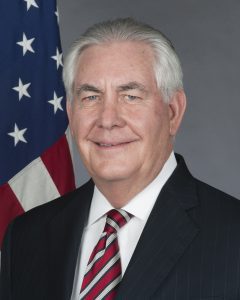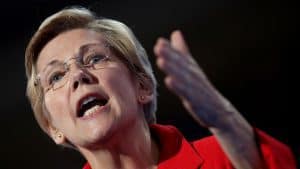
Just-ousted Secretary of State Rex Tillerson was one of several top Trump advisers who warned the President of the problems that steel and aluminum tariffs would create for US allies
Our trade expert L.C.’s weekly trade report follows:
President Trump’s March 8th proclamations of tariffs of 25% on steel and 10% on aluminum — but with tariff exclusions for Canada and Mexico — have created considerable political and economic complications for the President and his Republican allies. Trump issued the proclamations under Section 232 of US trade law, which allows tariffs for compelling national security reasons. He announced that only Canada and Mexico are excused from the tariffs — at least initially – and that the tariffs will take effect on March 23rd.
The President explained the Canada and Mexico exemptions as follows:
“I conclude that Canada and Mexico present a special case…[g]iven our shared commitment to supporting each other in addressing national security concerns, our shared commitment to addressing global excess capacity,…the physical proximity of our respective industrial bases, the robust economic integration between our countries, the export of [the metals] produced in the US to Canada and Mexico, and the close relation of the economic welfare of the US to our national security.”
Close US allies including Japan, the EU, Australia, and South Korea believe that this explanation applies no less to them and will be angered if denied tariff exclusion.
And it’s not just military allies and those with free-trade agreements (FTAs) with the US but also Brazil, whose steel industry is closely integrated with the US and imports much US coal to fuel its steel mills. Argentina is also demanding to be excluded.
Adding to the confusion is the fact that the White House hasn’t made clear just how countries can apply for exemptions or how companies can apply for product exclusions from the tariffs, or just what criteria will be used to make these decisions.
Among allies, a diplomatic mess
The diplomatic situation is becoming unpleasant. Australian Prime Minister Malcolm Turnbull spoke to the President and thought he had obtained an exemption. But the President then tweeted that an Australian exemption might be tied to completion of an unspecified defense arrangement with the US. Turnbull denied this conditionality; Australia already has an alliance with the US.
Across the Atlantic, after the UK said it would seek an exemption, the EU responded that there can be no separate treatment for members of the bloc, creating further uncertainty.
If one goes by the President’s tweets this week, he is particularly dissatisfied with Tokyo and Brussels, though how that might play into his exclusion decisions isn’t known. Regarding Europe, he tweeted,
“The EU, wonderful countries who treat the US very badly on trade, are complaining about the tariffs on steel and aluminum. If they drop their horrific barriers and tariffs on US products going in, we will likewise drop ours.”
Trade skirmish or trade war?
If Trump sticks to that condition for the EU, there will be at least a trade skirmish if not the trade war he said he’d welcome: Brussels repeated this week that it would quickly retaliate if tariffs are imposed.
Given the President’s apparent frame of mind – as indicated in his speech at a March 10th campaign rally in Pennsylvania as well as his tweets vowing to slap new tariffs on European cars if the EU retaliates – any trading partner reprisals are likely to provoke him to escalate with further trade measures.
Why exemptions could worsen the penalty for those not exempted
Exempting countries is not easy. Exempting the NAFTA countries spurred every other trading partner that exports a significant amount of steel or aluminum to announce that they too will seek exemptions. But this would nullify the rationale for the tariffs. That’s why after President Trump declared his intention on March 1st to impose the 25% and 10% tariffs on all countries, his advisers explained that there would be no country exemptions. The Commerce Department argued that if a country were to be exempted, the tariffs on the rest of the world would have to be raised to make up the difference. The President is free to ignore Commerce’s recommendation and do whatever he wants. But the point of the tariffs was supposed to be to protect endangered domestic industries needed for national security – so any exemption would mean that protection has been lessened and must be made up for elsewhere by higher tariffs — if the national security rationale is to hold.
This dynamic makes the country-exemption question much more complicated than it first appeared. It doesn’t seem that anyone in the Administration thought through the implications of what they were doing. All the more so because (1) China is the country that created the problem of overproduction of steel and aluminum in the first place, by lavishly subsidizing its domestic producers; (2) the Trump tariffs will have little effect on China – just on US allies; (3) the uncertainty created by the tariffs — who will get the exclusions, who will retaliate, how much, when — is putting numerous US and foreign investments on hold. This has negated the positive effects of the US tax reform bill. If the economy stalls, Republicans could lose one or both houses of Congress in November.
Democrats all in for Trump tariffs, but not so many Republicans

President Trump’s main tariff supporters are Democrats, including ultra-Progressive Sen. Elizabeth Warren
The drum beat of rejection of the President’s tariffs from Republicans continued this week. 107 House Republicans led by Ways & Means Committee Chairman Kevin Brady (R-TX) and Trade Subcommittee Chairman Dave Reichert (R-WA) sent a letter to the President supporting action “against China and other unfair trading partners” but “expressing concerns” about the harm that “broad tariffs” could do to the US economy.
A stunning pro-free-trade statement was also issued by the Republican Study Committee, the largest caucus in the Congress — comprised of over 150 conservatives:
“Free trade underpins the economic foundations of our alliances and partnerships, directly furthering America’s national security interests while limiting the destructive reach of authoritarian powers.
“American consumers benefit from free trade….
“Tariffs on imported goods are a tax on American consumers and businesses…. At least half of American imports are… input materials for… manufacturers. Free trade reduces the cost of these input materials… which in turn promotes economic growth through additional investment….
“Free trade and free markets have led to the greatest reduction in global poverty in the history of mankind.
“Government imposed barriers to materials, labor and capital are disruptive to modern supply chains and represents liberal central-planning in its worst, most arrogant form.
“While we strongly disagree with the imposition of punitive tariffs, we do believe that the federal government should aggressively protect American[s]… from the economic devastation caused by the unfair dumping of foreign goods… and barriers to American products.”
In a stunning reversal, the President’s main supporters for the steel and aluminum tariffs are in the Democratic Party, including his nemesis Elizabeth Warren.
Trans-Pacific Partnership treaty signed

Eleven nation Trans-Pacific Partnership agreement signed in Chile
The 11 countries of the Comprehensive & Progressive Trans-Pacific Partnership (CPTPP) formally signed their treaty in Santiago, Chile, on March 8th, coincidentally the same day President Trump signed his tariff proclamations. The CPTPP success is a defeat for US trade policy. It means that Washington has not convinced others of the alleged disadvantages of multi-country trade deals. In fact, more such deals are in the works:
- Canada moved immediately after the signing to begin talks for a Canada-MERCOSUR FTA (full members: Argentina, Brazil, Paraguay and Uruguay) and is in talks with the Pacific Alliance (Mexico, Colombia, Chile, and Peru);
- Associate member Bolivia is close to joining MERCOSUR as a full member;
- The EU and Mercosur are negotiating a closer trade relationship;
- South Korea is also looking to forge a preferential trade agreement with MERCOSUR, as well as becoming an associate member of the PA. It is also one of several countries interested in joining the CPTPP;
- Australia and the PA are also negotiating an FTA.
Section 301 actions planned against China
The Trump administration is hinting that it will soon – probably within a month – announce the President’s decision in response to the Section 301 investigation of China’s unfair tech transfer policies and theft of trade secrets and intellectual property.
But the US Trade Representative (USTR) Robert Lighthizer is having more trouble than anticipated in developing punitive responses that are legal and effective without harming US interests. There has reportedly been an intra-Administration fight between those proposing the imposition of wide-ranging tariffs on “hundreds” of Chinese exports vs. those wanting a targeted approach that goes after products the US can readily import from elsewhere. It is also expected that the measures will target Chinese investment in the US, but again the issue is how fine-tuned it should be. Should it block all Chinese individuals and entities from any investments in the US or only state-controlled companies and only investments in US assets with security or advanced tech/innovation dimensions?
Another factor complicating the USTR’s recommendation is the attitude of US companies. Despite the enormous abuses by China, including horrendous and brazen trade-secret and IP theft as well as discrimination against the operations of US companies, China is an enormous export market for the US. GM, for instance, sells more cars in China than in the US. China is the largest market for many US farm exports and an important location for US investment and the foreign operations of US companies. Thus, although the US private sector has become increasingly disappointed in Chinese commercial behavior in recent years, decrying China’s backtracking from reform, its forced tech transfer, and imposition of new discriminatory laws (cybersecurity, anti-monopoly), US companies are wary of the US government taking heavy-handed actions that might provoke Beijing to make things even more difficult. For this reason, some companies are pushing for the US to first attempt negotiating with Beijing.
Click here for previous post of Founders Broadsheet (“President bends slightly to pro-trade Republicans; conservatives come out in opposition”)

Leave a Reply